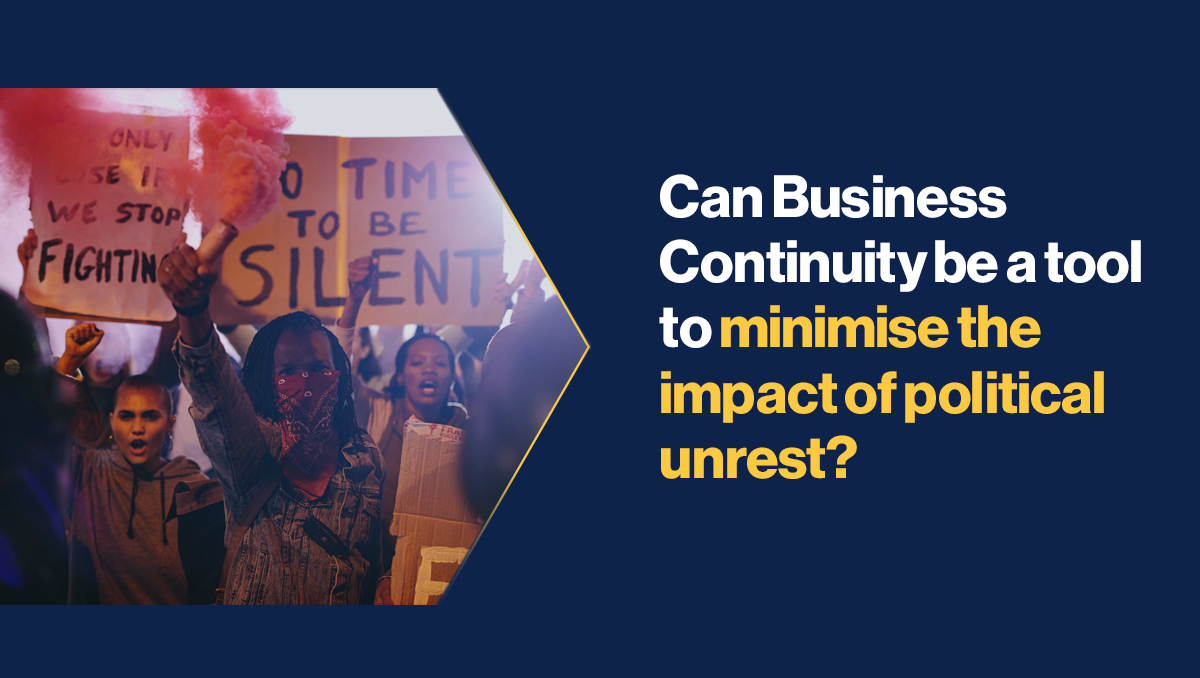Can Business Continuity be a tool to minimise the impact of political unrest?

Between the 9th and the 17th of July 2021, South Africa witnessed widespread riots, looting and burning of businesses after former President Jacob Zuma began serving a 15-month jail term. The violence escalated into the worst unrest since the end of apartheid. Violence spread through KwaZulu-Natal and Gauteng – the two most populous provinces, which together account for half of South Africa’s economic output.
Banks, malls, ATMs, schools, and other facilities were looted and damaged causing major disruptions and losses to local businesses. According to local industry groups, some companies – especially smaller ones - may take years to be rebuild their businesses.
What happened in South Africa poses serious questions on how organizations can prepare and mitigate the impact of large-scale incidents: is Business Continuity the answer?
We reached out to Brighton Njambi, Business Continuity and Resiliency Advisor at Disaster Recovery South Africa, who shared with us a strategy that can be put into place when proper business continuity planning is conducted. According to Njambi, a solid strategy will consider all scenarios and help:
- Define policies that are clear on what is expected of personnel when there is unrest. These must be well communicated beforehand. This way, even if you are unable to communicate with all your stakeholders during a crisis, they have a basic understanding of the standing protocol and course of action.
- Maintain up to date and tested crisis communication plans to protect your human resource. This goes a long way in ensuring that you give direction to your personnel in times of unrest. Lives can be lost when employees try to brave the situation just to ensure they report for duty - even at the risk to their lives. Business Continuity prioritises lives over livelihoods.
- Where possible, having alternative recovery sites will go a long way. When the unrests began in the provinces in South Africa, some areas remained safe and organizations that could conduct business from alternate sites or work from home were able to continue or possibly move operations to safer locations.
- Take up business insurance for these kinds of crisis events – this will allow you to financially rebuild in the post-incident period.
- Invest in good security for your key infrastructure resources. This will not only go a long way in ensuring a valid insurance claim, but also may possibly reduce the direct impact to your investments. As witnessed here, some companies/shops that had good security around their premises or co-locations (malls and business parks) fared better.
- Have pre-agreements in place with security providers to ensure you are covered in times of crisis.
- Maintain up to date and tested plans for recovery post incident.
The events that unfolded in South Africa in last few months have highlighted once again that organizations can never be too prepared. Njambi explained that while the impacts of the COVID-19 pandemic have opened the eyes of most organizations to the need for business continuity, these political unrests have brought about another realisation: that incidents can escalate very quickly and be out of control - even for those with plans. He also added ‘companies across all industry sectors and of every size must revisit their contingency plans and factor in events that may have seemed farfetched in likelihood or underrated in impact. Risk Management and Business Impact Analyses need a review as we count the costs of the unrest; and collaboration - even with traditional competitors - has become critical to ensure survival of businesses. Having a business continuity plan in place can be the deciding factor on whether organisations will recover or go under.’









































